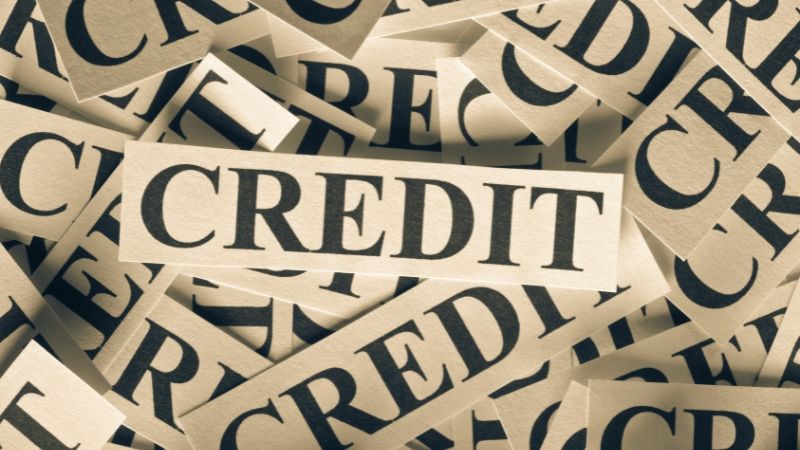Categories
Credit for Businesses | The 13 Best Options Compared

Every business needs money to run, more money to stabilise, and even more money to expand and succeed. While a simplistic model of self-sustainability may work for micro businesses, for enterprises designed to thrive, it's necessary to look to support from the financial service industry.
In short, it’s important to leverage business credit if you want your business to grow.
What is Credit for Businesses?
The idea of credit is simple; it’s an agreement between two parties that allows one party (the borrower) to obtain money, goods, or services from the other party (the lender) without immediate payment, but instead with a promise to repay the credit at a later date.
For your business, business credit is an important system that allows you to stretch and accomplish things now that you might not be able to financially cover until later.
Credit is especially important for business growth, as often expansion is dependent on taking opportunities as they arise, and generating profit from those opportunities.
In this guide, we explore the 13 different types of credit for business. If at any point you feel the need to speak to a specialist about your options and what's likely best for your business, you can book a free, no-obligation consultation below with an adviser.
How Much Could You Borrow?
Use our business loan calculator below to see what you could borrow.
See the latest market news below.
2025 Business Finance Market Update
In the past year, business finance saw significant growth, perhaps surprisingly driven by challenger lenders and alternative finance providers. Many of these lenders reached their largest milestones in 2024, primarily through supporting SMEs that may have struggled to access traditional funding elsewhere.
Businesses are continuing to face significant economic challenges carried over from 2023. High inflation, supply chain disruptions, and geopolitical tensions persist, which have complicated financial planning and made it difficult for businesses to acquire funding.
But the Bank of England has cut its base interest rate for the first time in 4 years, signalling a cautious shift toward economic stabilisation after years of inflationary pressure. Further cuts are anticipated, and businesses can expect a flurry of spending in the coming months.
As well as this, a number of banks and large firms seem to be racing to the finish line to implement generative AI and new technology that could streamline business and boost profits. Enhancing tech in banking looks like a win-win for lenders and borrowers, offering more personalised financial solutions and a quicker, more secure process.
In the tech industry, investments in AI are reshaping business. Tech giants like Alphabet, Amazon, and Microsoft have seen their market values surge, driven by the rush to implement AI.
 The 13 Best Types of Credit for Businesses
The 13 Best Types of Credit for Businesses
There are three main categories of credit for businesses available from finance providers: loans, lines of credit, and asset finance.
Between these three categories are 13 different types of credit for businesses.
Loans
Loans are the most familiar form of business credit and can come in a variety of forms, each with its own terms and associated interest rates and fees. The 4 main types are:
1. Unsecured Loans
An unsecured business loan is not tied to a business asset and is relatively easy to obtain.
Many young and startup businesses look to unsecured loans as a form of early finance. Because the loan is not guaranteed through collateral, the business credit score is an important metric for the lender to determine risk and borrower suitability.
Many lenders will ask for a personal director’s guarantee, and interest rates are typically higher than for similar sized secured loans. See related: How Personal Guarantee Insurance can protect your own assets.
2. Asset-based Loans
Also known as ‘secured loans’, asset-based loans leverage your business assets, such as property or equipment, to provide a guarantee for the lender.
These assets can then be seized should the repayments not be met. Asset-based loans are less risky to the lender, so can have favourable interest rates, making them an excellent loan for businesses looking to expand.
3. Commercial Mortgages
A specific type of asset-based loan developed to allow businesses to purchase property, commercial mortgages use the associated property as collateral.
They are an excellent way for a business to expand as property is rarely a poor investment.
4. Business Bridging Loans
Designed to offer significant capital at near-instant speeds, business bridging loans are an example of business credit designed for entrepreneurs to seize opportunities as they arise.
Intended for short-term use only and with higher rates of interest, bridging loans are often structured to be replaced by secondary finance options (such as a commercial mortgage) as part of an exit strategy.

Lines of Credit
Ongoing lines of credit, also known as ‘revolving credit facilities’, provide the business with access to a pool of capital it can dip in and out of as needed.
As you only pay interest on the money used, a well-managed line of credit offers a company a financial helping hand when required, without the burden of large monthly repayments that a loan would represent.
5. Company Credit Cards
The most frequently used business line of credit, once set up, company credit cards provide access to additional funds without the need for further loan application.
6. Bank Overdraft Facility
Excellent at helping ensure obligations are met when cash flow is tight, an overdraft is a little extra financial assistance from your bank best used sparingly but there when it’s needed.
7. Invoice Finance
Developed to help B2B businesses bridge the gap between an invoice being issued and the customer making payment, invoice finance can help growing businesses weather the storm of uncertain cash flow.
8. Merchant Cash Advance
Leveraged against predicted card transactions, merchant cash advance provides seasonal businesses, such as hotels, restaurants, or shops, a way to smooth out cash flow over the whole year.
Asset Finance
Rather than offering credit in the form of direct capital, asset finance is a subset of business credit designed to facilitate obtaining valuable physical assets such as vehicles, plant machinery, technology, and even office furniture, without having to expend precious capital on its investment.
9. Hire Purchase
Buy now, pay over time, hire purchase is a well-regarded form of asset finance that enables businesses to buy much needed assets today and pay them off with regular monthly repayments.
10. Finance Lease
Perfect for businesses looking to have control over an asset but without the responsibility of ownership, a finance lease offers access to the latest technology for low monthly payments, with an option to buy at the end of the term.
11. Operational Lease
Closer to a hire agreement than ownership, an operational lease is a worry-free way to have use of the latest assets. With contracts that can include all maintenance and insurance in one, operational leases offer businesses ease of use and peace of mind wrapped up in one single monthly payment.

More Subtle Forms of Business Credit
Loans, lines of credit, and asset finance provide ways for businesses to obtain capital or equipment from financial providers, but they are not the only form of regularly used business credit.
Two further scenarios represent credit agreements between the business and another party, and rightly come under the umbrella of ‘business credit’.
12. Business-2-Business Credit
Credit is often offered from one business to another, most often seen in the form of invoicing.
Here, the supplying business (as a lender) provides their goods or services without demanding instant payment, with the receiving business (as a borrower) given time (typically 30 days) to make that payment.
B2B credit in this way is often under-appreciated by the borrower, but it should be treated with the same respect as any other business credit arrangement.
Many successful businesses understand this principle and maintain excellent B2B relationships through the swift payment of any outstanding invoices. To help this system, banks and other financial institutions offer Supply Chain Finance, a form of business credit finance offered to ensure invoices are paid without delay.
Supply chain finance lifts the cash flow strain off your suppliers and improves your relationship.

13. Staff and Salaries
One other form of business credit that is often overlooked is that provided by your staff in terms of their work.
As with all other forms of business credit, it is essential that you don’t mistreat this arrangement, but treat the repayment of wages and salaries with the priority it deserves.
If you are struggling to meet these obligations, then a number of financial support options exist that can reduce the strain on your current cash flow, allowing you to keep your obligations to your staff.
Consider:
- Lines of credit, such as an overdraft or invoice finance.
- An unsecured loan for an injection of capital.
- A secured loan to leverage company assets in your favour.
Case Studies
Explore some of our recent case studies below of how we've helped businesses get access to credit, with bespoke solutions based on their cash flow and business assets.
Business Credit Score - Proving Your Creditworthiness
The key metric for lenders looking to assess your company for obtaining business credit is your business credit score.
Like your personal credit score, the business credit score (sometimes called ‘business credit report’, ‘company credit rating’ and other similar variants) is a number that is calculated based on your recent credit transaction history.
When you interact positively with credit providers (for example paying a recent credit card bill on time), your score increases; similarly, when you interact negatively (such as defaulting on that credit card bill), points are deducted.
Keeping a positive business credit score is essential if you want to leverage business credit to your advantage. Not only does it affect the likelihood of successfully obtaining credit, but also determines the terms of that credit - a better business credit score means preferential interest rates, lower fees, and other factors.

While your business credit score does account for activity going back as far as seven years, it is the most recent three months that have the most impact. When looking to obtain business credit, it is often worth spending a few months concentrating on improving your credit score before making an application.
It should also be noted that business credit score is not the sole metric that will be considered by lenders. While significant weight is placed on it, especially for unsecured financing such as basic business loans and company credit cards, other financial factors will be taken into account when determining your company’s credit suitability.
Working with Business Creditors
Whichever form of business credit, from an unsecured loan to a service agreement with a cleaning company, it’s essential that you maintain a good relationship with your creditor.
Making your repayment obligations is a must. Failure to do so can have negative effects on your business, from denting your credit score, through losing staff or having assets repossessed, to finding yourself facing liquidation.
If you find yourself struggling, it’s important that you communicate with your creditors honestly, and seek help.
At Clifton Private Finance, we have a team of experts who will consider the vast range of financial options available to help you during periods of difficulty. Don’t worry alone; call us for some understanding and advice.
Obtaining Credit As A Business
Finding and securing the right business credit can be a complicated process but we’re here to make it easy.
It’s perfectly possible for you to scour the internet for the best deals, research the best options, and put together the best application - but why put yourself through that?
We have strong relationships with the financial institutions in the UK marketplace, and all the expertise needed to help you select the product most suited to your business needs.
Contact us today to talk to an advisor.











